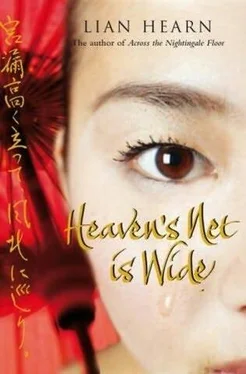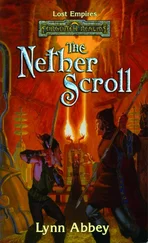Those I have to live with, Shigeru thought, but did not say it to Irie. He felt the sense of liberation that action brought. Irie was right: far better to act decisively than to sit in endless discussion and consultation, paralyzed by superstition and fear.
“Now I will speak to Nesutoro,” he said. “There is no need for you to come with me.”
Irie bowed and went back to the shrine. As Shigeru walked to the house where the village headman lived and where his brother-in-law was being tended, Kiyoshige joined him out of the shadows.
“The horses are tethered and fed. And guards have been set all around the village. There’s not a lot to eat, but the men are not complaining. In fact, they’re happy-they can’t wait to have another go at the Tohan.”
“I think they’ll get that soon enough,” Shigeru replied. “Word of this encounter will reach Inuyama within days, and the Tohan will respond. But by then we’ll have reinforcements. And from now on our borders will be patrolled and guarded properly.”
They came to the headman’s small house. It had an earthen floor with a tiny raised matted area for sleeping. Here Nesutoro lay, a woman kneeling beside him. When she saw the visitors, she bowed to the floor, staying low until her husband spoke quietly to her. Then she rose and brought cushions for them, placing the cushions on the step near the injured man. She helped her brother to sit and leaned his head against her own body, acting as a support to him. In the dim lamplight her face appeared drawn, bruised with grief and tears, but Shigeru could perceive the likeness to her brother in the planed cheekbones and almost triangular eyes.
Nesutoro’s eyes glittered like coals with fever and pain, but the sharp features softened into a real smile at the sight of Shigeru.
“Are you able to talk a little?”
The man nodded.
“I am interested in your beliefs and want to know more about them.”
Nesutoro looked anguished. His sister wiped the sweat from his face.
“Answer Lord Otori,” the headman pleaded, then added apologetically, “They are so used to keeping everything hidden.”
“There is no danger from me,” Shigeru said impatiently. “But if I am to protect you from the Tohan, I must know what I am defending. I leave here at dawn. You are not fit to travel with me. So, if you are able, we must talk now.”
“What does Lord Otori want to know?”
“For a start, what are the images that you have to defile?”
The woman made a slight sound as if she was about to sob.
Nesutoro moved his hand and traced a character on the matting, two lines crossing each other, as in the number ten.
“What does it signify?”
“We believe the Secret One sent his son to Earth. The son was born to an ordinary woman and lived as a man. He was put to death in the cruelest way, nailed to a cross, but he came back from the dead and now sits in Heaven. He will judge us all after death. Those who know him and believe in him will join him in Heaven.”
“Everyone else goes to hell,” the headman added, sounding remarkably cheerful about it. His wife was weeping silently now.
“Where does this teaching come from?” Shigeru questioned.
“From far away in the West. Our founder, the saint whose name I bear, brought it from Tenjiku to Shin over a thousand years before, and from there teachers came to the Eight Islands hundreds of years ago.”
It sounded like any other legend to Shigeru, possibly founded in truth but overlaid by centuries of human imagination, wishful thinking, and self-delusion.
“You may think we are mad,” Nesutoro said, sweat pouring from him. “But we know our God’s presence: He lives inside us…”
“They have a ritual meal,” the headman explained. “When they share food and wine, they believe they eat their god.” He laughed as if to show that he did not share such outlandish beliefs.
The wife spoke suddenly. “He gave himself for us. He suffered so we might live. Everyone, anyone-even me, a woman. In his eyes I am as good as a man, as my husband, even as…”
Her husband slammed his fist into the matting. “Be quiet!” He bowed low to Shigeru. “Forgive her, Lord Otori, her grief makes her forget herself.”
Shigeru was astonished by her words and equally by the fact that she had dared to speak in his presence at all. He could not remember ever hearing a peasant woman speak directly to him. He was both affronted and intrigued. He felt Kiyoshige tense next to him and held up his hand to restrain the younger man. He thought Kiyoshige might draw his sword and cut her down-anywhere else the woman would have been punished immediately for her insolence, but here in the bare, impoverished house, alongside the suffering man, it was as if they had moved into a different world, where the rigid codes of his society no longer applied. He felt compassion stir within him. He had, after all, inquired about the beliefs of these people called the Hidden. Now he was learning about them, not only through words but directly through the person of the woman in front of him, who believed herself to be his equal.
“There is another image,” she said abruptly. “Lord Otori should know…” Again she glanced directly at him, but after that one look, she lowered her eyes again. Her voice became softer-he had to strain to hear it, leaning forward toward her. “It is the mother and child,” she whispered. “She is the mother of God, the child is God’s son. Our way honors women and their children and seeks to protect them against the cruelty of men. God will punish those who persecute us-even the Iida lords.”
When they left early the following morning, smoke still rose from the charred beams and thatch; it tasted raw in Shigeru’s throat. The smell of burning made the young horses nervous, and they jibbed and pig-rooted as the riders followed a narrow track through the rice fields and then up the side of a low range of hills, where the dry fields of vegetables-pumpkins, beans, onions, and carrots-gave way to bamboo groves and then to an upland forest of beech and cedar. They went in single file, which gave no chance for conversation, but when they stopped at the head of the range to let the horses drink from a shallow pool filled by a spring, Kiyoshige remarked, “So this strange sect is to come under your protection?”
“To tell you the truth,” Shigeru replied, “the sect does not bother me one way or the other. They seem harmless enough. But as long as they are Otori, I will protect them against the Tohan. If they are to be eradicated, it will be our decision. We will not allow the Tohan to decide such things for us.”
Irie said, “This is an entirely reasonable position. No one can find fault with it.”
“I’ve been thinking about Kitano,” Shigeru went on. “We are within his domain-my first instinct was to try to keep this from him. But he will be told as soon as we arrive in Chigawa. So I believe it is better to confront him head-on and send messengers ourselves, demanding that his sons be recalled from Inuyama and that he himself come to Chigawa to reaffirm his vows of loyalty to my father and myself.”
“And if the Iida do not allow the boys to return?”
“We must find some way of applying pressure so they comply.”
“Like what?” Kiyoshige asked. “There’s not much we can bargain with.”
“Lord Irie?”
“I’m afraid Kiyoshige is right: we can threaten further attacks, but that’s more likely to enrage and harden the Iida than persuade them. And we must be careful not to be drawn into full-scale war, for we are not prepared for it yet.”
“How long would it take the Otori to be ready for war with the Tohan?”
“Next year, the year after.”
Читать дальше












